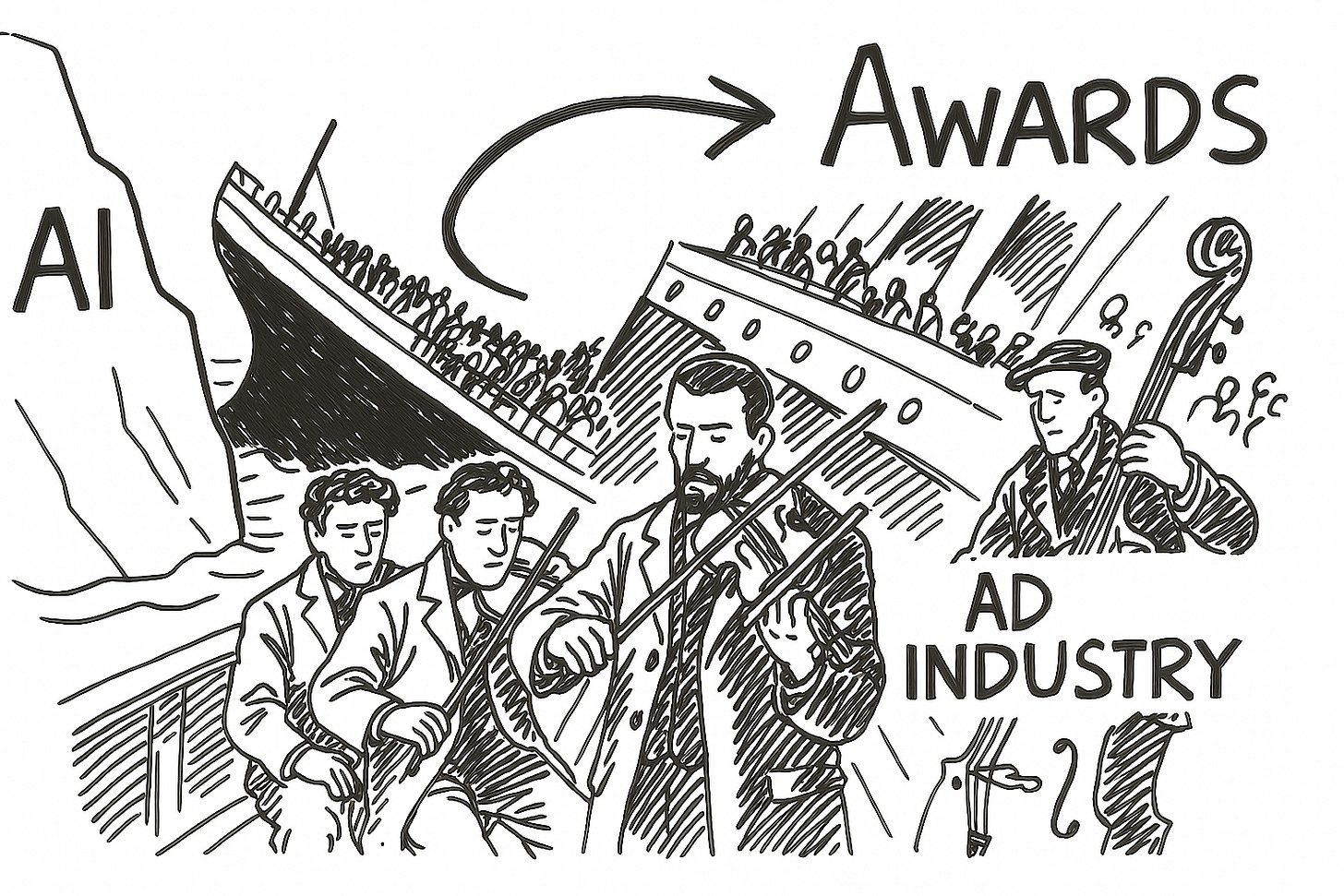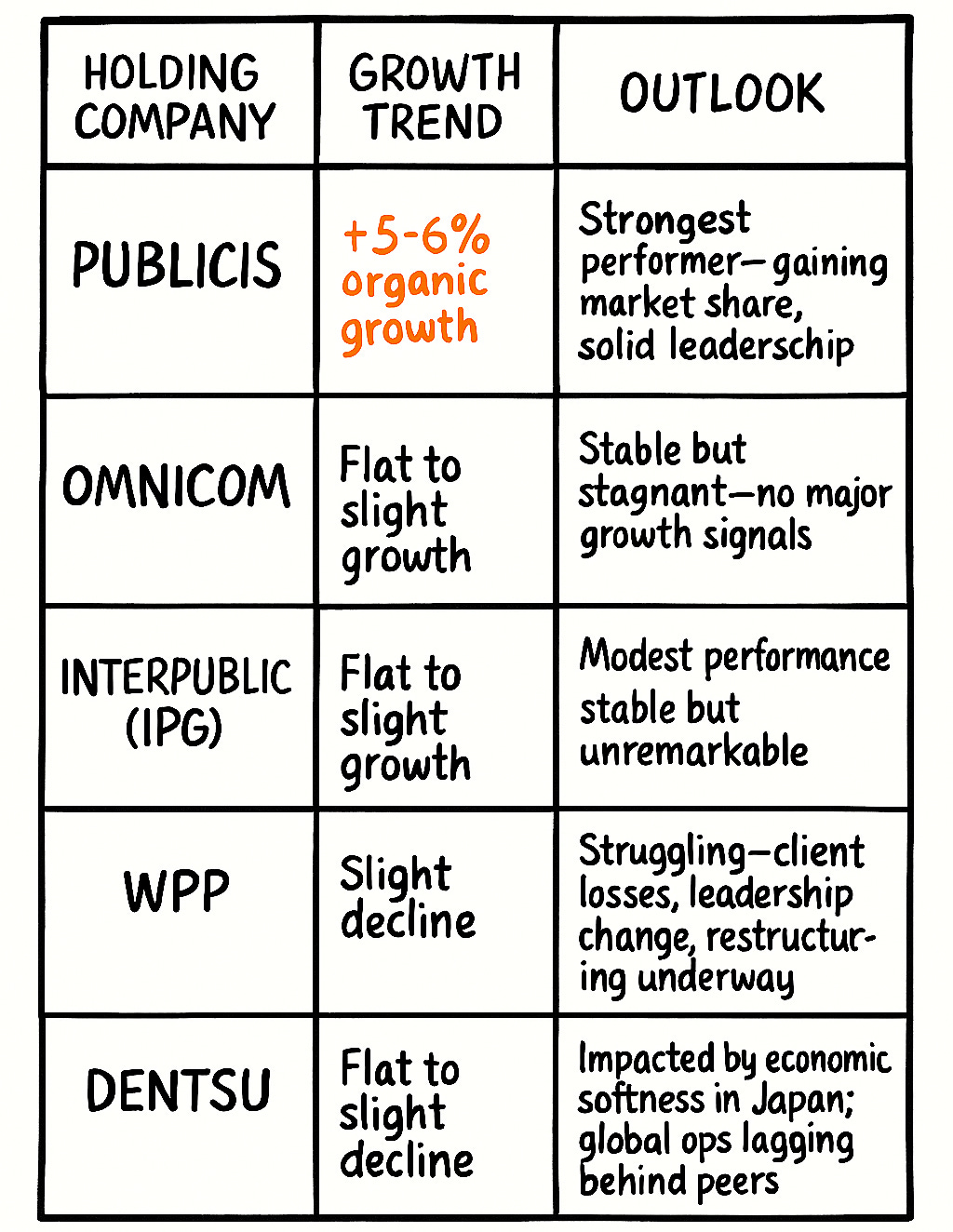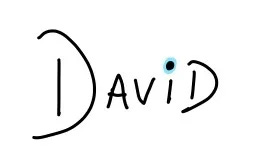Cannes, Chaos And The Ad Industry’s Thirty Thousand Body Problem
Advertising Is The Slowest Sinking Ship
There’s a haunting image embedded in the collective memory of modern history—musicians on the deck of the Titanic, calmly playing their instruments as icy waters rapidly swallowed the “unsinkable” ship.
As chaos reigned, lifeboats lowered, passengers panicked, and the realization hit that most would not survive—a small group of musicians, led by Wallace Hartley, chose to stand together and play. Not to save themselves, but to do what they could: offer a semblance of dignity in the face of unimaginable disaster.
They played hymns, waltzes, whatever they knew by heart. Survivors recall the final tune as “Nearer, My God, to Thee.” Whether that was true or not doesn’t matter—the act itself, not the setlist, mattered.
It’s not a perfect metaphor, but watching the advertising industry celebrate at Cannes this year made me think of the hapless musicians playing on the deck of the Titanic. Meanwhile, over on the French Riviera, the tone is different, at least on the surface; the Titanic musicians played somberly, reflectively, knowing that the one thing they could control was how they would depart this world. In contrast, this year's attendees at Cannes (well, pretty much every year) are there to celebrate, network, job hunt, land business, and feed egos.
Industry veteran Brian Morrissey captures how Cannes has evolved over the years as traditional creative types no longer wield the influence they once did:
“Ad creatives used to be the fedora-wearing stars of Cannes; now it’s the creators who command large and loyal audiences. This is not just a tech story. Creatives are incentivized to go direct rather than work for an ad agency, especially if you're not going to Capetown to shoot a car going down winding roads.”
Cannes has changed with the times and is as relevant as ever, but the ad business, with a few exceptions, is beginning to show systemic signs of stagnation at best and gradual decline at worst:
The holding companies—WPP, Omnicom, IPG, Dentsu—aren’t just showing cracks, they’re displaying the early signs of structural fatigue. Revenue is flat or falling. Leadership changes are happening mid-crisis, not post-recovery. And even the strongest players, like Publicis, are winning less on the strength of traditional advertising muscle and more through consultative, data-driven transformation. Meanwhile, the industry’s iceberg—AI—looms larger by the day, reshaping how brands communicate, how content is created, and ultimately, who adds value in this chain.
First Comes The Iceberg, Then Comes The Chaos
AI is the iceberg in the ad world—slowly surfacing, expanding, and reshaping the landscape beneath. Meta, for instance, invested around $68 billion into AI infrastructure in 2025 (up from $39 billion the year before). It recently acquired a 49% stake in Scale AI to anchor its LLaMA model ecosystem and further automate its advertising stack. Its Advantage+ platform and Lattice tools deliver 22%+ higher ROAS (Return On Ad Spend), automating everything from creative to placement. The trajectory is clear: within a year or two, a brand might only need to submit a product image and budget—Meta’s AI will do the rest.
Google, on the other hand, is transforming the search experience itself. Its AI-powered Search Generative Experience (SGE) is beginning to embed ads directly into conversational overviews. This shift is already reducing referral traffic to publishers by 50% or more, disrupting the traditional performance marketing model and changing how people interact with the web.
For holding companies like WPP, Omnicom, IPG, and Dentsu, this isn't just a feature shift—it’s a reordering of the ecosystem. Platforms like Meta and Google are disintermediating creative, media, and strategy services, putting massive pressure on agencies to redefine their value. As more ad dollars bypass traditional models in favor of platform-native, AI-optimized campaigns, the existential threat becomes hard to ignore. The iceberg is moving—and unless the holding companies reinvent themselves meaningfully, they’re headed for an eventual collision.
Advertising’s Thirty Thousand Body Problem
Let’s use another metaphor, borrowing generously from science fiction. In The Three-Body Problem, Liu Cixin paints a picture of Earth encountering a technologically superior alien civilization—the Trisolarans. They are advanced, ruthless, and aggressively approaching. As humanity begins to comprehend the scale and inevitability of this confrontation, it’s faced with an uncomfortable truth: our science, systems, and thinking are inadequate for what’s coming. The metaphor isn’t subtle—the book explores existential scale, systems that collapse under pressure, and what it means to prepare for a future that’s already rewriting itself.
Now, consider the modern advertising holding company. The business model has long depended on a ground army of billable bodies: planners, creatives, strategists, analysts, and account managers—stacked across org charts and scoped by the hour. The logic is linear: more headcount means more revenue. Scale is achieved by winning more clients and filling more timesheets. People are the product. The spreadsheet reflects the machine: input bodies, output, profit.
But here comes the iceberg, or in this case, the Trisolaran fleet—called AI. Generative models, automation tools, and intelligent platforms are now doing what was once the domain of junior and mid-level agency staff—writing copy, building media plans, analyzing performance, and crafting iterations. Meta doesn’t need your planner anymore, they’ve built a hive-mind planning machine with an all-access pass to rich consumer data. Google doesn’t need your media buyer—it’s automating the funnel.
This isn’t sci-fi. It’s infrastructure.
It also threatens to make the “bodies for billings” model inefficient and obsolete. And let’s not get started on all of those “GenAI” tools. Take a look at the recent AI-generated NBA ad that went viral:
Every CMO should ask their agencies the same question: “Shouldn’t your use of AI mean smaller, more efficient teams and better output?” After all, AI's promise is superhuman augmentation meets intelligent automation.
They are probably are asking this very question…
If growth has historically come from headcount, where does it come from now? This is the question that ad holding companies must confront with the same urgency humanity faced in Liu’s novel. Growth must become nonlinear. It must be tied to IP, platforms, and proprietary value, not just people. Yes, people will still matter. But not in the same way. The challenge now is pivoting from organizations built on mass semi-manual labor to those defined by networked intelligence. The AI encounter won’t be disrupted if the model doesn't evolve. It’ll be a reckoning.
The Slowest Sinking Ship
And so, we return to Cannes.
I wasn’t there in person, but saw the pinkish-gold rosé flow from afar via social media. The awards glittered. The rooftop panels buzzed with talk of purpose and innovation. Yet beneath it all, I bet attendees felt a quiet hum—a low-frequency signal that something fundamental is shifting. AI isn’t coming. It’s already here. And like the Trisolaran fleet or that looming iceberg, it’s not interested in our intentions—it’s changing the environment we operate in.
The ad industry may well be the slowest-sinking ship of all time. It won’t go down in a spectacular submersion. It will slowly, almost imperceptibly, take on water. And many aboard will keep dancing. Keep hiring. Keep measuring headcount, serving free gluten-free pizza while measuring hours billed as the core metric of business viability.
But this isn’t about vibes or imported Italian espresso machines operated by in-office baristas. It’s about economies of scale. The platforms Meta, Google, Amazon, and TikTok are building systems where scale no longer comes from bodies. It comes from compute, code, and models trained to do what we used to do, only faster, cheaper, and increasingly better.
The change won’t be felt all at once. It never is. But it will be felt.
The massive ad holding companies won’t disappear overnight. But the intelligent iceberg is real. So is the advanced AI agent-powered alien civilization developing in front of our eyes. The question is, who’s steering the ship—and who will be playing music amongst the chaos?
Visually yours,











Extremely thoughtful (and timely) piece, David. Easily one of the best reflections on Cannes I've read in a while. I also didn't attend this year, but rather used AI to show a semblance of "presence" (albeit from "Cincinnati Beach"). Now running an AI-first startup, I just couldn't justify the investment, and I still suspect I can lure as many good leads with a LinkedIn or Substack post as attending Cannes. Also, as a two-time juror, I think Cannes needs to think harder about how it recognizes "creativity in the age of AI." For example, in my 12+ months running BrandRank (including thousands of band audits) I've found that "boring basics" like creating attractive/inviting FAQs (something most brands ignore) do more to improve brand presence in AI search results than just about any other brand/digital action. Cannes should have an entirely new category for creative achievement in areas that matter to the AI future. I have a short list of categories we can discuss/debate. :-) https://www.linkedin.com/posts/consumergeneratedmedia_cannes-lions-starter-kit-for-those-attending-activity-7340362781801488384-4JDg?utm_source=share&utm_medium=member_desktop&rcm=ACoAAAACFvEBNvfH6Se3Kpvsg03cgiBfvk2UB5k
Good article, and no surprise about the creatives going direct at Cannes (in a parallel universe, we are seeing that with journalists here on Substack). Great assessment on the AI front, too. It made me think about how Verdino and I often joke about being recovering marketers.
For me, it speaks to my desire to not specifically serve companies with marketing, creative, and campaign management right now, specifically because of the incoming AI revolution. I just cannot see this ending well for most agencies, who are looking at reductions or collapse depending on their ability to adapt. Sure, some will thrive, but to be honest, I'd rather be on the tech side of this one.